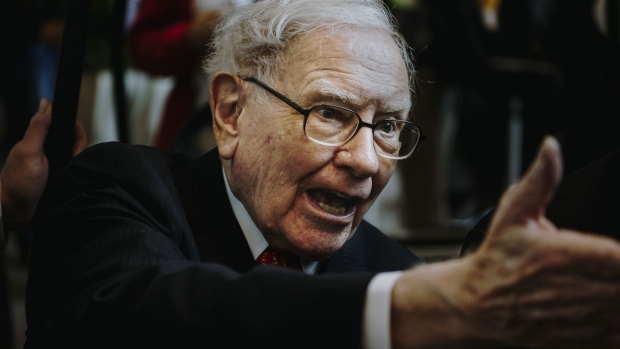Aug 30, 2022
Warren Buffett Cuts Stake in China’s BYD, Spurring Bets More May Come
, Bloomberg News

(Bloomberg) -- Warren Buffett’s Berkshire Hathaway Inc. trimmed its stake in BYD Co., just over a month after speculation the legendary US investor was preparing to shed his entire position in the Chinese carmaker sent its stock plummeting.
Berkshire cut its holding in BYD’s Hong Kong-listed shares to 19.92% from 20.04% on Aug. 24, according to an exchange filing Tuesday. That equated to around 1.33 million securities at an average HK$277.10 ($35.30) apiece, valued at about $47 million.
Theories about Buffett’s plans have swirled since a 20.49% stake -- identical to the size of Berkshire’s last reported BYD position in Hong Kong as of December -- entered the Central Clearing and Settlement System last month. The move triggered the biggest slump in BYD stock in nearly two years.
A BYD spokesperson wasn’t immediately able to comment Tuesday, while representatives for Berkshire to date haven’t commented. The shares closed slightly lower at the end of Hong Kong trading.
Read more: Buffett’s Silence on BYD Fuels Trader Theories on Next Move
This is “most likely profit taking,” said Kerry Goh, chief investment officer at Kamet Capital Partners Pte. in Singapore. “BYD has done very well for them especially in the last three years. It’s not their style to sell just because someone says China is uninvestable.”
Asked if Buffett could be gearing up to sell more of his BYD holding, Goh said it was hard to second guess the titan of investing.
When Buffett sold shares in another of his Chinese investments, PetroChina Co., he did it in stages. The 2007 sale was conducted through at least seven transactions over a period of about three months.
“This may shake the firm belief in BYD shares for a lot of institutional investors,” said Franklin Tang, an analyst at Excel Investment Hong Kong Ltd.
“While there are those that hold a bullish view based on fundamentals, with stock prices having been on a roll there’s bound to be plenty of speculators as well,” Tang said. “This will make the latter very skittish as their conviction was largely based in trusting the judgment of Buffett.”
BYD is one of China’s most-watched automakers. On Monday it reported net income for the six months through June at the top end of guidance as record output and sales shielded it from Covid-related production disruptions and supply-chain pain. BYD could deliver 1.5 million to 2 million vehicles this year as capacity expands to meet a backlog of orders, according to Bloomberg Intelligence analysts Steve Man and Joanna Chen.
The Shenzhen-based automaker is also expanding overseas, announcing sales in seven new markets in recent months including Japan, Thailand and Germany.
Read more: China’s BYD Aims to Rule EV World by Being Anything But Tesla
Chief to BYD’s success is its vertical integration strategy, which involves not only manufacturing vehicles but producing semiconductors and batteries. It’s now the world’s third-largest producer of batteries for EVs, with 14% of the global market, behind Chinese rival Contemporary Amperex Technology Co. Ltd. and South Korea’s LG Energy Solution Ltd.
And Buffett, a long-time backer of BYD, has certainly ridden the wave. Shares in BYD gained 31% last year and surged 423% in 2020.
Buffett’s investment in the automaker is worth north of $8 billion from around $230 million when he first invested in the company in 2008. The 92-year-old, the chairman and largest shareholder of Berkshire, has a net worth of about $100.2 billion, according to the Bloomberg Billionaires Index.
The BYD position that matched the size of Berkshire’s appeared in Hong Kong’s stock-market clearing system under a Citibank’s account. Since then, Citibank’s holding in BYD’s Hong Kong-listed stock has dropped by around 9 million shares, Hong Kong exchange data show.
Hong Kong regulations state that a shareholder who owns more than 5% of a listed company must notify the stock exchange within three business days of initiating a trade if that trade changes the percentage of the stake into the next whole number.
(Updates with further context in final paragraphs.)
©2022 Bloomberg L.P.





